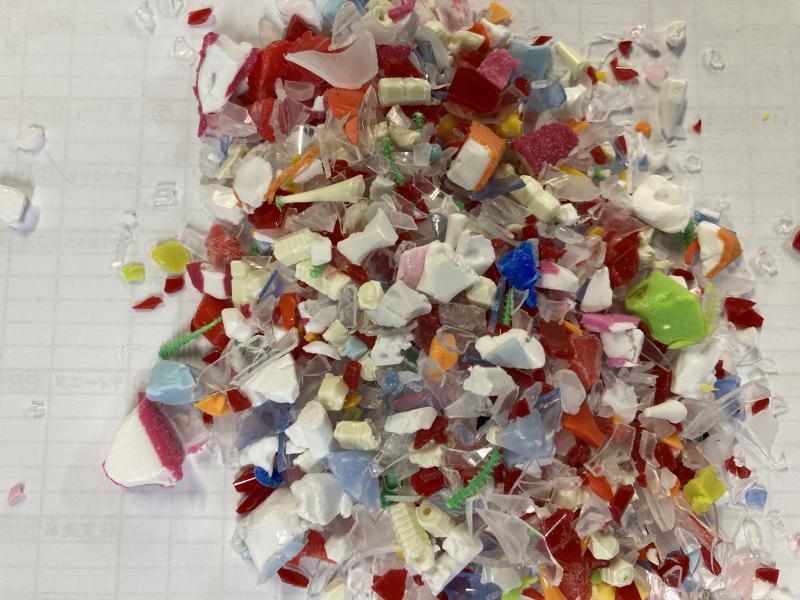Coming into force. The "Plastic Resource Recycling Promotion Law" will revolutionize resource recycling
"A big revolution is about to happen." Masayuki Isono, president of Isono (Higashi-ku, Nagoya), a plastic recycling company, cannot hide his excitement. The "Plastic Resource Recycling Promotion Law", which will come into force in April 2022, is the epicenter of the revolution. It may force companies to use recycled plastics and reduce single-use plastics, greatly changing resource recycling in Japan.
Isono crushes and melts waste plastic products to produce recycled pellets that are used as materials for products. Immediately after Prime Minister Yoshihide Suga announced in October 2020 that he would aim to reduce greenhouse gas emissions to net zero by 2050, the number of inquiries surged.
Manufacturing new plastic from crude oil generates carbon dioxide (CO2), but recycled plastic can reduce emissions. In countries that have introduced a carbon tax that levies taxes according to the amount of emissions, the use of recycled plastics can be tax-saving, and companies expanding overseas are interested in recycled plastics. The company is also involved in resource recycling of "car-to-car", which recycles the plastics of scrap cars and supplies them as plastics for new cars. The current handling is a small amount, but I have a feeling that it will increase rapidly.
President Isono also said, "I feel the flow of ethical consumption (considering the environment and society)." An increasing number of consumers appreciate eco-friendly materials, and restaurant operators have started using recycled plastic for home delivery lunch boxes. With the Sustainable Development Goals (SDGs) and ESG (Environment, Society, Corporate Governance) investments and loans, recycling has become directly linked to corporate evaluation.
The plastic resource recycling promotion law determines the growing demand for recycled plastic. "We have a law that says, 'I've been waiting,'" (same), rejoicing. One of the highlights of the new law is a system that allows manufacturers and retailers to voluntarily recall used products. Currently, permission is required under the Waste Management and Public Cleansing Law, but the new law will allow unlicensed manufacturers and others to collect them on the condition that they create a recycling plan.
If voluntary collection spreads, the amount of waste plastic products collected will increase. Recyclers can increase the production of recycled pellets and meet the demands of manufacturers seeking recycled plastics. "It will be easier for recycling companies to move around, and we will be able to further cooperate with resource recycling," he said.
The new law will also allow municipalities to collect all waste plastic products from households. Currently, PET bottles and food trays specified by the Containers and Packaging Recycling Law are covered. The new law will also make it possible to collect toothbrushes, toys, and clothes hangers, giving recycling companies more opportunities to procure waste plastics. "Residents and local governments who have cooperated in sorting waste plastic products will also be rewarded," he said.
According to President Isono, inquiries from the same industry are increasing as a result of the new law. "Recycled plastic has been chosen because it's cheaper than new material. Now, people's awareness of cost is about to change. A big revolution is about to happen," he says.
There are other points in the new law. The government plans to oblige businesses that distribute more than 5 tons of single-use plastics to be disposed of after one use to reduce their use. If the efforts are insufficient, the government will issue recommendations and orders, and those who do not comply will be fined up to 500,000 yen. The target disposable plastics are planned to be 12 items such as spoons and straws distributed at stores, hairbrushes provided to hotel guests, and hangers at dry cleaners. Business operators will be asked to take measures such as charging a fee, returning points to those who refuse to receive them, and reusing them after collection.
In addition, the government will set design guidelines to reduce the use of plastic, and a system will be established for manufacturers to receive certification. Since the adoption of recycled plastics is also included in the guidelines, competition for waste plastics is expected.
In 2019, Japan produced 8.5 million tons of waste plastic. Reuse remains at 22%. Triggered by the new law, a change to a “true recycling society” begins.
Terracycle, an American company, has been recycling products that were thought to be difficult to recycle in Japan, such as coastal trash and toothbrushes. In 2021, the company launched Loop, which provides manufacturers and retailers with a system for reusing cosmetics and seasoning containers, and has been a leader in resource recycling in Japan. We asked Eric Kawabata, representative of Terra Cycle Japan (Naka-ku, Yokohama), about his expectations for the new law. (Editorial committee, Takashi Matsuki)

- Do you feel the changes in the Japanese market?
"When China restricted the import of waste plastics at the end of 2017, Japan was forced to domestically dispose of the waste plastics that had been exported. The fact that 60% of the
“ESG finance has spread, ecology has become an investment decision.Companies need to improve ESG, and the business of Terra Cycle has increased.In 2017, 11 companies sponsored the recycling business in Japan. We've increased from 6 companies in January to 26 now."
-Loop, which reuses containers, has also started in Japan.
"If there is economic rationality in using reusable containers for a long time, they can compete with single-use plastics. Japan has a culture of reuse, such as beer bottles, and there is a foundation for increasing reuse."
-What is the impact of the new law?
“Hotels, restaurants, and cafes that handle disposable plastic are interested in Loop.
- What are your expectations for the new law?
"I take it as a big message to reduce disposable plastics. If consumers have the idea of using products for a long time, manufacturers can also work on designs that assume reuse."
-Europe has taken the lead in resource recycling.
"I don't think Japan is behind. Japan has a well-developed infrastructure for waste disposal, and it is difficult for consumers to notice the problem of garbage. When they understand that it is an important problem, consumers move quickly." think"
Nikkan Kogyo Shimbun December 20, 2021
COMMENT
The incineration of waste plastic is no longer called recycling. Isn't it a big change in the last few years? It's my feeling, but I think we can increase reuse and repair more. If it breaks, I think I'll buy a new one because the repair cost is high. I think there are many people who subconsciously want to keep using it, so there seems to be a business opportunity in repair. Also, what should I do with novelties such as clear files and ballpoint pens that are left unused on my desk?








